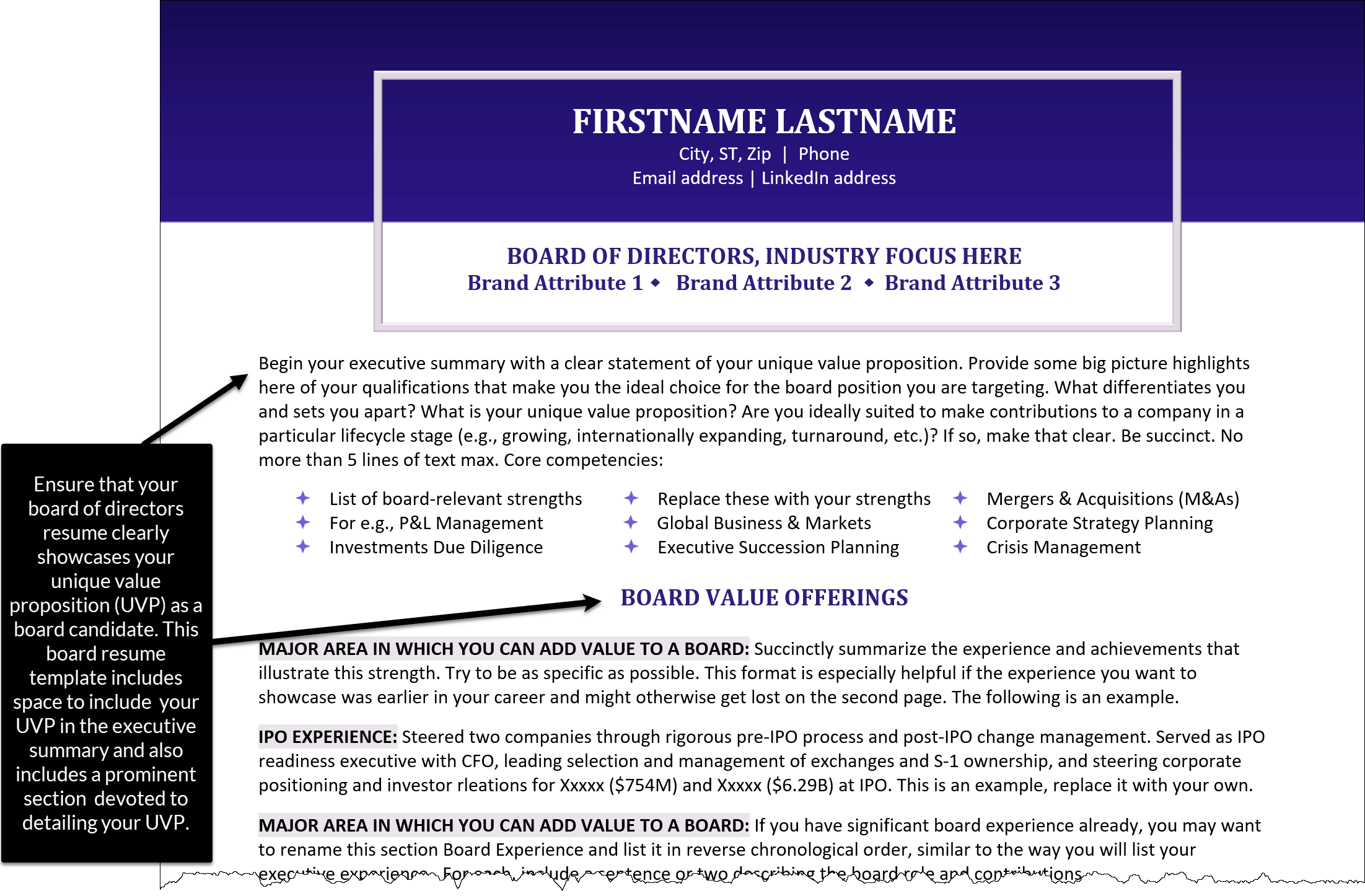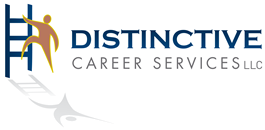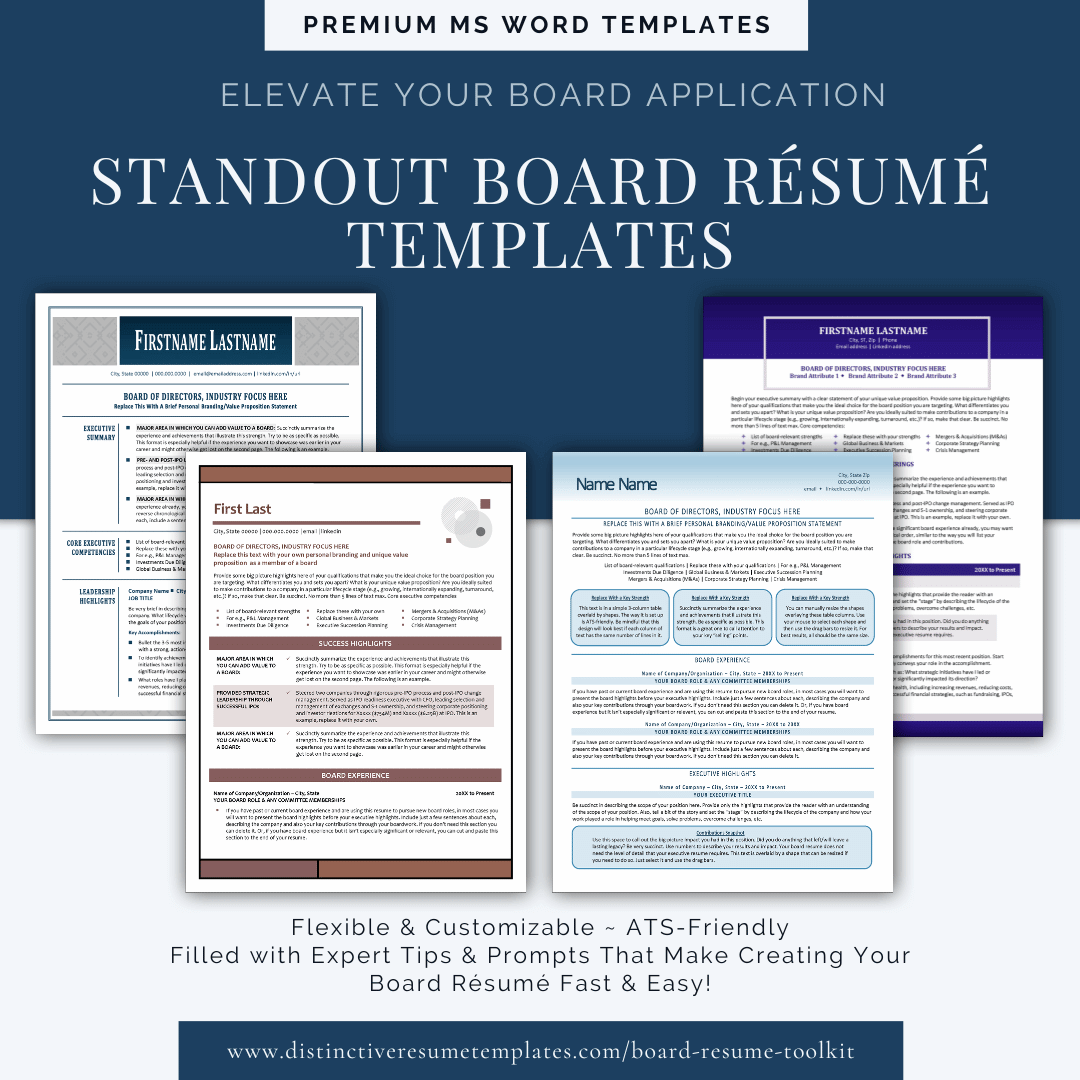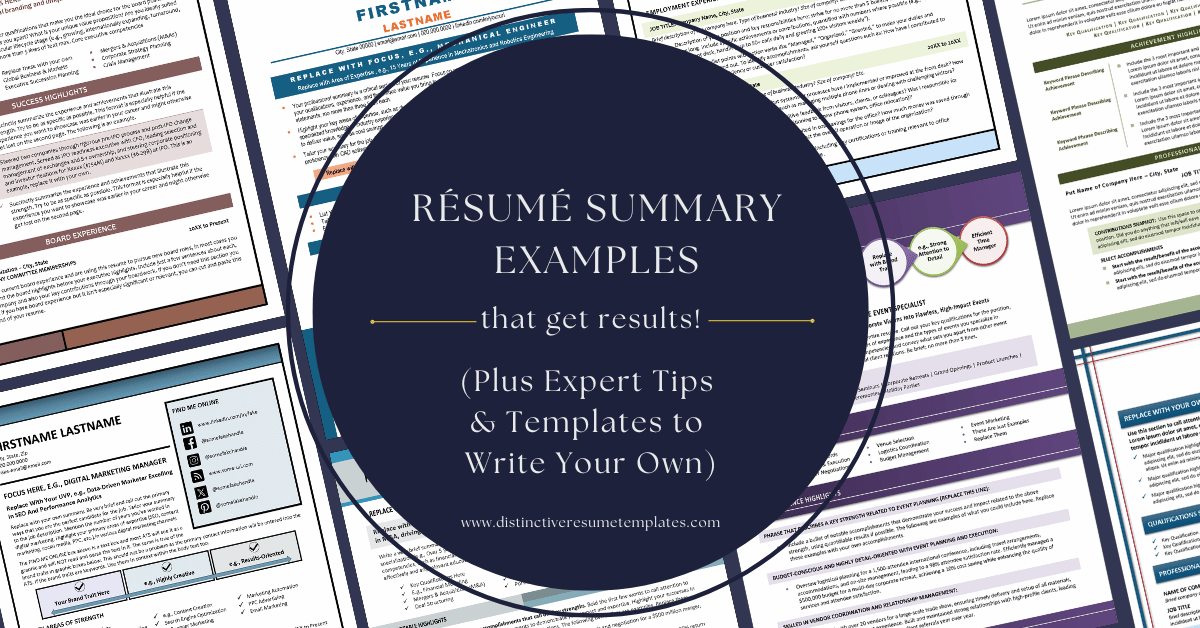
Writing a resume for a board director position is a unique challenge that demands a strategic focus on governance, leadership, and oversight capabilities.
Unlike traditional executive resumes, which often highlight operational achievements and management skills, a board resume must underscore your ability to contribute at the highest level of organizational strategy and decision-making. It’s about painting a picture of yourself as a visionary leader who can offer valuable insights and guidance to steer a company towards success in an ever-evolving business landscape. This requires not only a deep understanding of the specific challenges and opportunities facing today’s corporations but also the ability to communicate your experiences and skills in a way that resonates with board nominating committees.
Read on to learn about common mistakes that can undermine the effectiveness of your board resume and offer practical solutions to ensure your document positions you as an ideal candidate for board service. By avoiding these pitfalls and applying the strategies outlined, you’ll be better equipped to craft a compelling narrative that highlights your readiness to make a significant impact at the board level.
For more comprehensive and in-depth guidance on writing a board resume, we invite you to check out our exclusive Board of Director Resume Writing Toolkit
Let’s dive in!
Mistake #1: Overemphasis on Operational Details
The Pitfall:
Many executives, when writing their board resumes, fall into the trap of detailing their operational experience. While operational achievements are commendable, they often don’t translate directly to the strategic oversight and governance acumen sought after in board members. A resume laden with operational details may lead to the oversight of your ability to contribute at a higher strategic level, which is a critical aspect of board service.
The Fix:
To position yourself as a board candidate, it’s essential to recalibrate your resume’s focus towards strategic leadership and governance capabilities. This involves a deliberate shift from operational achievements to highlighting your experience and contributions in shaping strategic direction, influencing corporate policy, and managing complex stakeholder relationships.
Here are some examples that illustrate how you might reword resume accomplishments for a board resume.
|
OPERATIONAL FOCUS |
REWRITTEN FOR A BOARD RESUME |
|---|---|
|
While these accomplishments demonstrate valuable leadership and problem-solving skills, they focus heavily on operational management rather than strategic impact. |
These revised statements pivot the focus towards strategic decision-making and governance, showcasing the candidate’s ability to drive significant corporate transformations and shareholder value enhancement. |
|
|
|
|
|
|
When revising your executive resume to transform it into a board resume, consider including instances where you’ve influenced the strategic direction of an organization from a high-level perspective. This could involve:
By emphasizing these aspects, you demonstrate a clear understanding of the broader implications of strategic decisions and your capacity to contribute valuable insights and leadership in a board setting.
Mistake #2: Lack of Clear Value Proposition
The Pitfall:
A resume without a clear value proposition leaves nominating committees guessing about your potential contributions. In the context of board director positions, where strategic insight and specific expertise are highly valued, this lack of clarity can significantly undermine your candidacy.
The Fix:
Crafting a compelling executive summary at the beginning of your resume is crucial. This resume section should succinctly articulate your unique value proposition (UVP), highlighting the distinct skills and experiences that make you an ideal candidate for a board position. Your UVP should align with the board’s current needs and future aspirations, demonstrating how you can contribute to navigating challenges and seizing opportunities.

This screenshot from one of the board resume templates that are included in the Board Resume Writing Toolkit illustrates how and where to incorporate your unique value proposition (UVP)
How to Articulate Your Value Proposition:
Crafting a compelling executive summary at the beginning of your resume is crucial. This section should succinctly articulate your unique value proposition (UVP), highlighting the distinct skills and experiences that make you an ideal candidate for a board position. Your UVP should align with the board’s current needs and future aspirations, demonstrating how you can contribute to navigating challenges and seizing opportunities.
By clearly defining and articulating your value proposition, you not only make it easier for nominating committees to see your potential impact but also position yourself as a strategic thinker and leader capable of contributing to high-level discussions and decisions. This approach transforms your resume from a mere list of accomplishments into a powerful statement of your board-level capabilities.
The Board of Directors Resume Writing Toolkit provides a step-by-step approach to help you identify and articulate your own board value proposition.
Mistake #3: Ignoring Board-Relevant Skills and Experiences
The Pitfall:
Many board candidates fail to adequately highlight or even mention skills and experiences that are directly relevant to board service. Skills such as governance expertise, risk management, stakeholder engagement, and strategic planning are crucial for board members. Overlooking these in your resume can significantly diminish your appeal as a board candidate.
The Fix:
Your resume should prominently feature experiences and skills that underscore your readiness for board responsibilities. This includes detailing your involvement in governance structures, your adeptness in navigating complex regulatory landscapes, and your proactive approach to risk management. It’s not just about stating these experiences; it’s about showcasing them through concrete examples that highlight your strategic contributions and leadership.
How to Highlight Board-Relevant Skills and Experiences:
These are just a handful of key board skills that you should include in your board director resume. The Board of Directors Resume Writing Toolkit will walk you through 23 essential board skills, as well as how to include them in your resume.
By deliberately including and emphasizing these board-relevant skills and experiences, you not only demonstrate your capability in areas critical to effective board service but also position yourself as a well-rounded candidate equipped to address the multifaceted challenges faced by boards today. Remember, specificity is key—use detailed examples to bring your contributions to life and show how your leadership has made a tangible impact.
Mistake #4: Neglecting the Importance of Formatting and Design
The Pitfall:
In the pursuit of presenting experience and qualifications, many executives overlook the critical role of formatting and design in their board resumes. A resume that is cluttered, difficult to navigate, or visually unappealing can significantly detract from the professionalism of your application, regardless of the stellar content it may contain. Additionally, a poorly formatted resume may cause problems with the accuracy in which your resume can be entered into the applicant tracking systems (ATS) that most recruiters and large corporations use.
The Fix:
Your resume’s formatting and design are not just about aesthetics; they’re about functionality and effectiveness in communication. Opting for a clean, professional resume design ensures that your strategic contributions, governance experience, and board-relevant skills are easily accessible and immediately apparent to nominating committees. Here are some key design elements to consider:
To illustrate these points, consider the following images of board resume templates that exemplify effective formatting and design principles.
Remember: while the content of your resume is paramount, don’t underestimate the importance of its presentation. A well-formatted and designed resume not only speaks to your professionalism but also enhances the readability and impact of your strategic contributions and governance qualifications.
The Board of Directors Resume Writing Toolkit includes 4 professionally designed board resume templates that make designing and formatting your board resume effortless.
Mistake #5: Failing to Tailor Your Resume for Specific Board Opportunities
The Pitfall:
One of the most common yet critical mistakes executives make when crafting their board resumes is adopting a one-size-fits-all approach. A generic resume, while comprehensive, may fail to address the unique needs, culture, and strategic direction of the board you’re aiming to join. Such an oversight can result in missed opportunities to showcase how your specific experiences and skills align with what the board currently needs or seeks in a new member.
The Fix:
The key to a compelling board resume lies in its customization for each unique board opportunity. This process begins with thorough research into the company or organization’s current challenges, strategic objectives, governance style, and board culture.
Armed with this insight, you can then tailor your resume to echo these elements, demonstrating not only your suitability for board service but also your proactive effort to understand and align with the board’s vision and needs. Here are some ideas for tailoring your board resume.
Customization in Action:
Consider a board that is actively seeking to enhance its ESG (Environmental, Social, and Governance) capabilities. A generic resume might list your leadership experiences broadly, but a tailored resume would specifically highlight your achievements in developing and implementing ESG strategies, leading sustainability initiatives, or driving social responsibility programs, directly addressing the board’s current interests.
Research and Reflection:
Customizing your resume for specific board opportunities requires both research into the board’s composition, recent activities, and publicly stated goals, as well as reflection on how your experiences and skills align with these areas. This tailored approach not only demonstrates your genuine interest and initiative but also significantly strengthens your candidacy by presenting you as a candidate whose background and vision are in sync with the board’s direction and needs.
While tailoring your resume for each board opportunity requires additional effort, it is a critical step in distinguishing yourself as the ideal candidate. By demonstrating a deep understanding of the board’s unique challenges and objectives and aligning your resume to reflect how you can contribute to these areas, you position yourself as a valuable and insightful prospective board member.
Final Thoughts: Essential Elements of a Winning Board Resume
Writing a board director resume is an art that requires a delicate balance between showcasing your strategic acumen and highlighting your governance expertise.
Avoiding the common pitfalls outlined above is crucial in elevating your resume from a mere professional summary to a compelling narrative that positions you as a leader adept in steering organizations towards success.
The guidance offered in this article serves as a foundational blueprint for constructing a document that resonates with nominating committees. If you want more help, the “Board of Directors Resume Writing Toolkit” provides not just board resume templates, but also an in-depth exploration of techniques and strategies for developing an effective board resume,
A meticulously crafted board resume does more than list your accomplishments; it weaves a narrative that underscores your unique value proposition as a board candidate. It’s a narrative that speaks to your ability to navigate complex challenges, drive strategic initiatives, and foster a governance culture that prioritizes long-term success and ethical leadership. As such, your resume should not only reflect your past achievements but also articulate your vision for contributing to a board’s future.
Key Takeaways for Aspiring Board Members:
In conclusion, your journey to securing a board position begins with a resume that effectively captures your leadership essence and governance prowess. By steering clear of common mistakes and employing the strategies discussed, you can write a board director resume that not only opens doors to boardrooms but also sets the stage for meaningful contributions to corporate governance. Remember, the effort and thoughtfulness you invest in your resume today can significantly impact your ability to shape the futures of organizations tomorrow.







